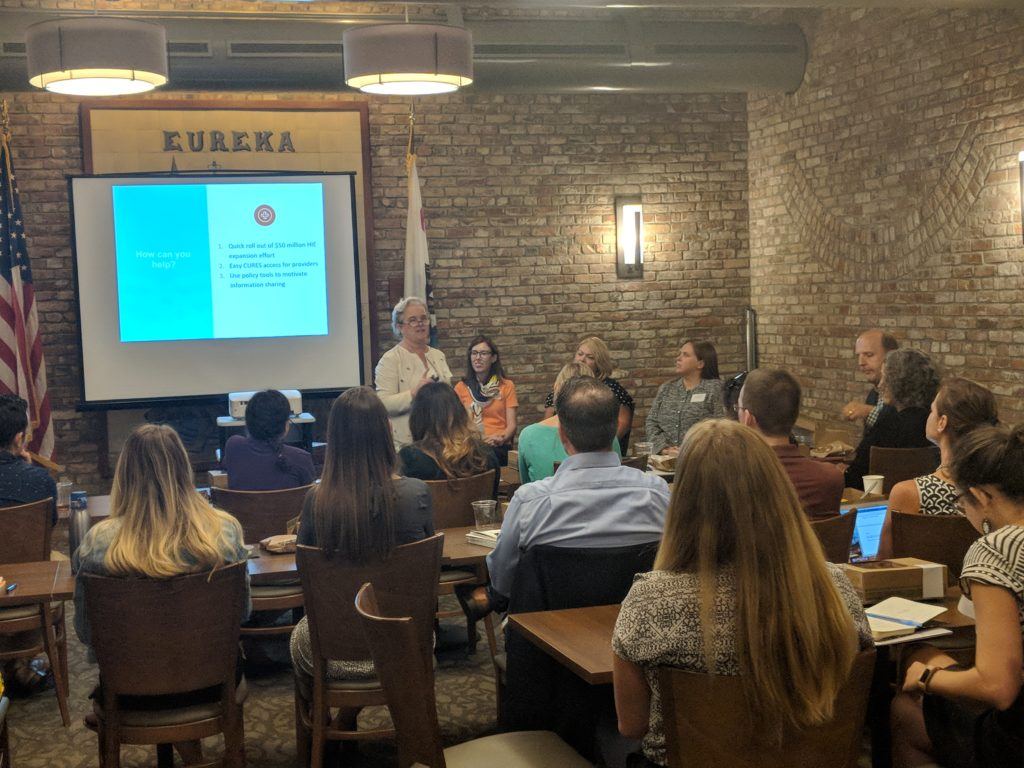
MX Hosts ‘Policy Day’ in Sacramento
Healthcare leaders need better, more accessible information to reduce costs and improve outcomes. Manifest MedEx is making this work easier by building a health data utility and by helping to bring $50 million in new funds to assist California providers with setting up data sharing.
To celebrate this legislative win and facilitate a discussion between health policy leaders, we hosted a special briefing day at the State Capitol. On a quiet Monday, at the start of the summer recess in Sacramento, about 25 attendees were expected. Instead, more than 40 people showed up from healthcare organizations in the area including Inland Empire Health Plan, Blue Shield of California, the Senate Office of Research, and various senator and assemblyman offices, standing room only, to hear about the progress on interoperability in California. A sense of both skepticism and optimism filled the space, feelings confirmed by a show of hands when participants were asked to raise their hands all the way for a 100% response to “how close do you think we are to interoperability in California today?”
The event included a panel and Q&A session with Claudia Williams, CEO of Manifest MedEx, Dolores Green, CEO of Inland Empire Health Plan, and Dr. Tanya Dansky, VP and Chief Medical Officer at Care1st Health Plan.
- Previously the senior advisor for health technology at the White House, Claudia Williams helped lead President Obama’s Precision Medicine Initiative. She has also served as director of health information exchange at HHS and as a director of health policy and public affairs at the Markle Foundation.
- Dolores Green is a leader in using health data to improve patient outcomes. She has served as the Executive Director of the Riverside County Medical Association (RCMA) since 1981 and has also been the Chief Executive Officer of the Inland Empire Foundation for Medical Care, since 1995. She oversees its PPO, EPO and Workers’ Comp Network activities as well as its ACO projects and its recently formed Community Care Network.
- Dr. Tanya Dansky is a board-certified physician in pediatrics and hospice and palliative medicine. She previously served as CMO of Amerigroup Washington, Columbia United Providers and Children’s Hospital of Orange County Health Alliance, and as CEO of Children’s Physicians Medical Group in San Diego.
Before the panel began, the event kicked off with a discussion of the ways in which data sharing is essential to improving quality while reducing healthcare costs and, most importantly, improving people’s quality of life.
The new funding approved in the California state budget just a few days earlier draws down a 90% federal match (for $50 million total) to close the connection gap. Hospitals and care providers will be able to access these funds for connecting to robust and successful existing health information exchanges (HIEs) over the next 18 months.
The funds will also allow HIEs to connect directly to the CURES database, marking an important step in the fight against the opioid epidemic. The HIEs across California will work together to be interoperable with one another, establishing true statewide connectivity. California lags far behind a number of other states, meaning we’re not making the progress we otherwise could on health, quality, and cost improvements. However, change is happening.
Panelists dove in, answering questions about the success of Inland Empire Health Plan in reducing readmissions through the use of the Manifest MedEx utility, lessons California can learn from other states that have used this funding, and the hardships small practices face when trying to get connected into HIEs.
Participants asked questions such as why do independent medical practices struggle to connect to HIEs? What factors have blocked or slowed the spread of health data sharing? When can we expect full connectivity in California?
Panelists responded to these tough questions, highlighting the substantial and growing evidence showing how HIEs can help providers improve outcomes and lower costs. Within California, the Inland Empire Foundation for Medical Care ACO has helped providers reduce readmissions dramatically using MX’s Notify service. Providers are alerted the minute their patients leave the hospital so they can follow-up quickly and lend a helping hand. The state of Maryland has also achieved over 6% reduction in readmissions statewide by connecting all their hospitals to CRISP, the state’s HIE, to deliver real-time notifications. New York has improved patient outcomes and reduced exposure to risks associated with certain medical treatments and diagnostic testing while decreasing cost using HIE services. Indiana has reduced the incidence of deadly hospital-acquired infections, mostly from MRSA, by sharing and using data via their statewide HIE.
The event concluded with recommended next steps for California’s health policy leaders. Several participants who started out as skeptics about the viability of a fully connected state HIE left convinced that data exchange has staying power and everyone took home a better sense of where our state stands.
For more information about joining the nonprofit Manifest MedEx health data exchange, please contact our team.